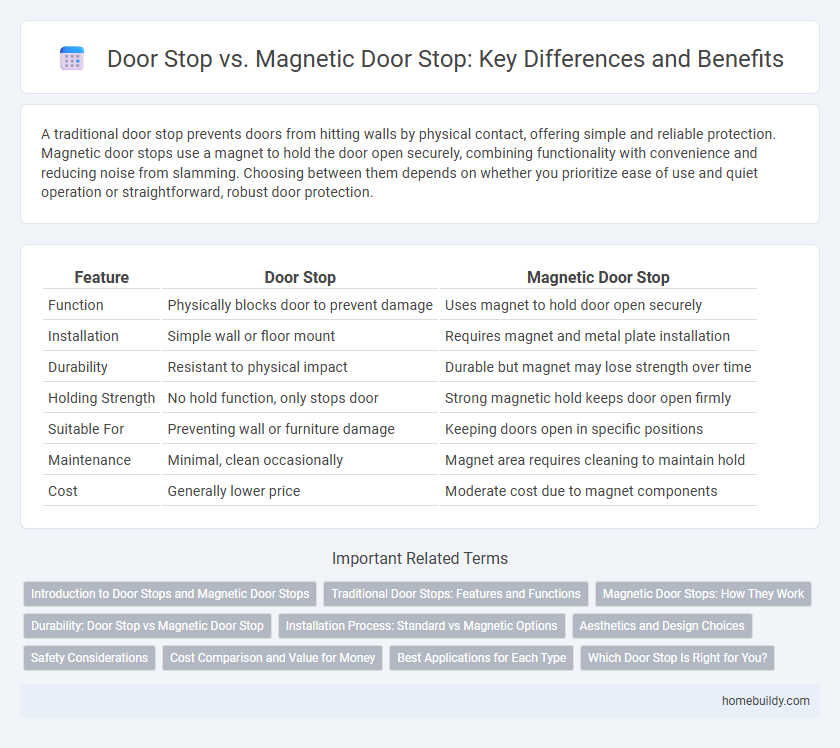A traditional door stop prevents doors from hitting walls by physical contact, offering simple and reliable protection. Magnetic door stops use a magnet to hold the door open securely, combining functionality with convenience and reducing noise from slamming. Choosing between them depends on whether you prioritize ease of use and quiet operation or straightforward, robust door protection.
Table of Comparison
| Feature | Door Stop | Magnetic Door Stop |
|---|---|---|
| Function | Physically blocks door to prevent damage | Uses magnet to hold door open securely |
| Installation | Simple wall or floor mount | Requires magnet and metal plate installation |
| Durability | Resistant to physical impact | Durable but magnet may lose strength over time |
| Holding Strength | No hold function, only stops door | Strong magnetic hold keeps door open firmly |
| Suitable For | Preventing wall or furniture damage | Keeping doors open in specific positions |
| Maintenance | Minimal, clean occasionally | Magnet area requires cleaning to maintain hold |
| Cost | Generally lower price | Moderate cost due to magnet components |
Introduction to Door Stops and Magnetic Door Stops
Door stops prevent doors from damaging walls or furniture by restricting their movement, typically using rubber or metal stoppers mounted on floors or walls. Magnetic door stops combine a standard stop with a magnetic catch that holds the door open securely without slamming, offering convenience and durability. These magnetic models are favored in both residential and commercial settings for their ability to keep doors in place effortlessly while minimizing noise and wear.
Traditional Door Stops: Features and Functions
Traditional door stops are typically made from rubber, wood, or metal and are designed to prevent doors from damaging walls by absorbing impact. They come in various forms such as wedge-shaped wedges, wall-mounted bumpers, or floor-mounted stoppers, providing versatile options for different door types and flooring materials. These door stops are durable, cost-effective, and easy to install but lack the hold function that magnetic door stops offer.
Magnetic Door Stops: How They Work
Magnetic door stops use powerful magnets to securely hold doors open by attracting a metal plate attached to the door, preventing unwanted closure due to drafts or accidental pushes. Unlike traditional door stops that rely on physical contact with the floor or wall, magnetic door stops provide a clean, damage-free solution by eliminating friction and wear. Their efficient design ensures doors remain firmly in place until the magnetic force is overcome, offering both convenience and durability in high-traffic areas.
Durability: Door Stop vs Magnetic Door Stop
Traditional door stops are often made from rubber or metal, offering reliable durability with resistance to wear and tear from repeated use. Magnetic door stops typically feature metal components and strong magnets, which provide lasting hold but may be prone to corrosion or magnet weakening over time. When comparing durability, metal door stops generally withstand physical impact better, while magnetic door stops excel in maintaining secure positioning without physical contact.
Installation Process: Standard vs Magnetic Options
Standard door stops typically require simple installation involving screws or adhesive mounts, making the process straightforward and accessible for most users. Magnetic door stops involve both a floor or wall-mounted magnet and a metal plate on the door, requiring precise alignment for effective operation. The magnetic option offers a more secure hold but may take slightly more time to install correctly compared to traditional door stops.
Aesthetics and Design Choices
Door stops offer versatile design options that blend seamlessly with various interior styles, providing functional support without drawing attention. Magnetic door stops enhance aesthetics by combining sleek metal finishes with modern minimalism, allowing the door to hold firmly without visible hardware clutter. Choosing between traditional and magnetic door stops depends on the desire for subtlety or a contemporary accent that complements the room's decor.
Safety Considerations
A traditional door stop prevents doors from slamming, reducing damage and injury risks, but may pose tripping hazards if placed on the floor. Magnetic door stops secure doors firmly without physical obstruction on the floor, minimizing tripping hazards and enhancing child safety. Choosing magnetic door stops improves safety by combining strong door hold with reduced floor clutter, ideal for high-traffic or family environments.
Cost Comparison and Value for Money
Door stops typically offer a lower upfront cost compared to magnetic door stops, making them a budget-friendly option for basic door-holding needs. Magnetic door stops, while more expensive initially, provide enhanced durability and functionality, reducing long-term replacement or maintenance costs. Evaluating cost versus value, magnetic door stops deliver better overall performance and longevity, representing a more cost-effective investment in high-traffic or commercial areas.
Best Applications for Each Type
Rubber door stops are ideal for preventing door damage in residential settings, providing a non-invasive barrier that absorbs impact and protects walls and floors. Magnetic door stops suit commercial or high-traffic environments where controlled door positioning is essential, utilizing magnetic force to hold doors securely open without physical obstruction. Both types optimize door management by enhancing safety and convenience tailored to specific usage scenarios.
Which Door Stop Is Right for You?
Choosing the right door stop depends on your specific needs and environment; traditional rubber or wedge door stops offer simple, adjustable solutions for preventing door movement and protecting walls. Magnetic door stops provide a more secure hold by using strong magnets to catch and hold the door in place, ideal for high-traffic areas where consistent door positioning is necessary. Consider factors like installation type, durability, and door weight to determine whether a basic or magnetic door stop best suits your space.
door stop vs magnetic door stop Infographic

 homebuildy.com
homebuildy.com